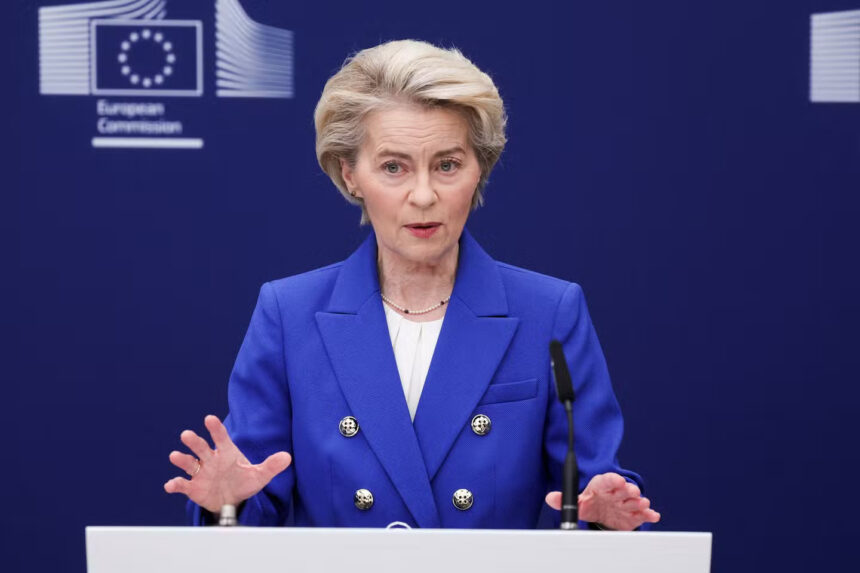Europe’s leaders had been preparing for “Trump’s trade war” – but the reality of a 20% blanket US tariff still came as a shock.
“This decision is a catastrophe for the economic world,” said French Prime Minister François Bayrou.
“The consequences will be dire for millions of people around the globe,” said the EU’s Commission chief Ursula von der Leyen, who was on a trip to Central Asia.
The message from the EU, which has the task of responding on behalf of its 27 member states, is that Europe is ready to negotiate with the US but at the same time poised to hit back too.
Europe ‘calibrates’ its response
EU Trade Commissioner Maros Sefcovic aims to talk tariffs with his US counterparts on Friday.
“We’ll act in a calm, carefully phased, unified way, as we calibrate our response, while allowing adequate time for talks,” he said.
For every European country, President Donald Trump’s tariffs will be a severe blow, and national governments have been trying to allay the fears of industry and commerce.
Italy’s Giorgia Meloni – who until Wednesday seemed more reluctant than others to retaliate in kind against the US – cleared her diary and hastily summoned ministers and business leaders to an emergency summit.
Italy exports €8bn (£6.7bn) worth of agrifood products and €2bn worth of wine to the US, Alessandro Apolito of the country’s main farmers’ organisation Coldiretti told the BBC.
Aside from economic losses, he says there is a risk that US consumers will turn to imitations, capturing market share that would otherwise go to authentic Italian products.
In Spain, Prime Minister Pedro Sánchez rejected Trump’s claim that the EU was imposing 39% tariffs on US goods, insisting in reality it was just 3%.
“It’s just an excuse to punish countries and implement sterile protectionism. The trade war will affect everyone, but it’ll hit the one imposing it most of all,” he warned.
Europe’s businesses hold their breath
The Spanish Chamber of Commerce fears a 14% cut in exports to the US, especially in machinery and electrical equipment. Sánchez has announced a €14.1bn response plan to help business with finance and look for new markets beyond the US.
Slovakia is more exposed than most EU countries, because of its heavy reliance on industrial exports, and some economists are warning of a deep fall in economic output of at least 2.5% in just two years.
Poland’s Prime Minister Donald Tusk warned of a potential 0.4% fall in its economic output this year.
Even before Trump’s announcement, the French government had revised down expected growth this year to 0.7%.
The French wine and spirits sector in particular is likely to be hit. The head of one of the main wine organisations, Jérôme Bauer, has warned of a net loss of €1bn (£835m) to France’s wine industry.
Italy’s winemakers are holding their breath too.
“We’ve halted exports for almost two weeks now. Everything is paralysed, because clients aren’t placing orders and importers aren’t importing,” says Stefano Leone of Marchesi Antinori, a winery in Tuscany with over six centuries of history.
The US accounts for 12 to 13% of total sales, and Leone says the company is in a state of limbo.
“We’re waiting to understand what decisions to make, depending also on any countermeasures the European Union may adopt in response to the United States. We’re hoping some form of negotiation will take place and lead to a concrete outcome.”
Sentiment across Europe’s markets was glum as investors sold shares considered most vulnerable to Trump’s tariffs. One of the big German companies, Adidas, saw 12% of its value wiped off the stock market.
Small companies as well as large are going to be hit.
“This is the first year we’ve started exporting to the United States, and the tariffs affect us even more directly,” says Rocco Mangiaracina, who runs a small family business producing 20,000 bottles of olive oil a year in Sicily.
“Only a week ago, we sent our first 900 bottles to the American market.”
French government spokeswoman Sophie Primas said “we are ready for this trade war”, but added that “the [European] Union must be strong, it must be united for this”.
Europe’s biggest economy, Germany, was quick to call out an “unprecedented attack on the international trading system, free trade, and global supply chains”.
But Germany is still waiting for chancellor-in-waiting Friedrich Merz to form a government, so it was up to acting chancellor Olaf Scholz to point out that the “world’s strongest internal market with 450 million consumers” gave Europe strength.
So how will the EU respond and can it stay united?





